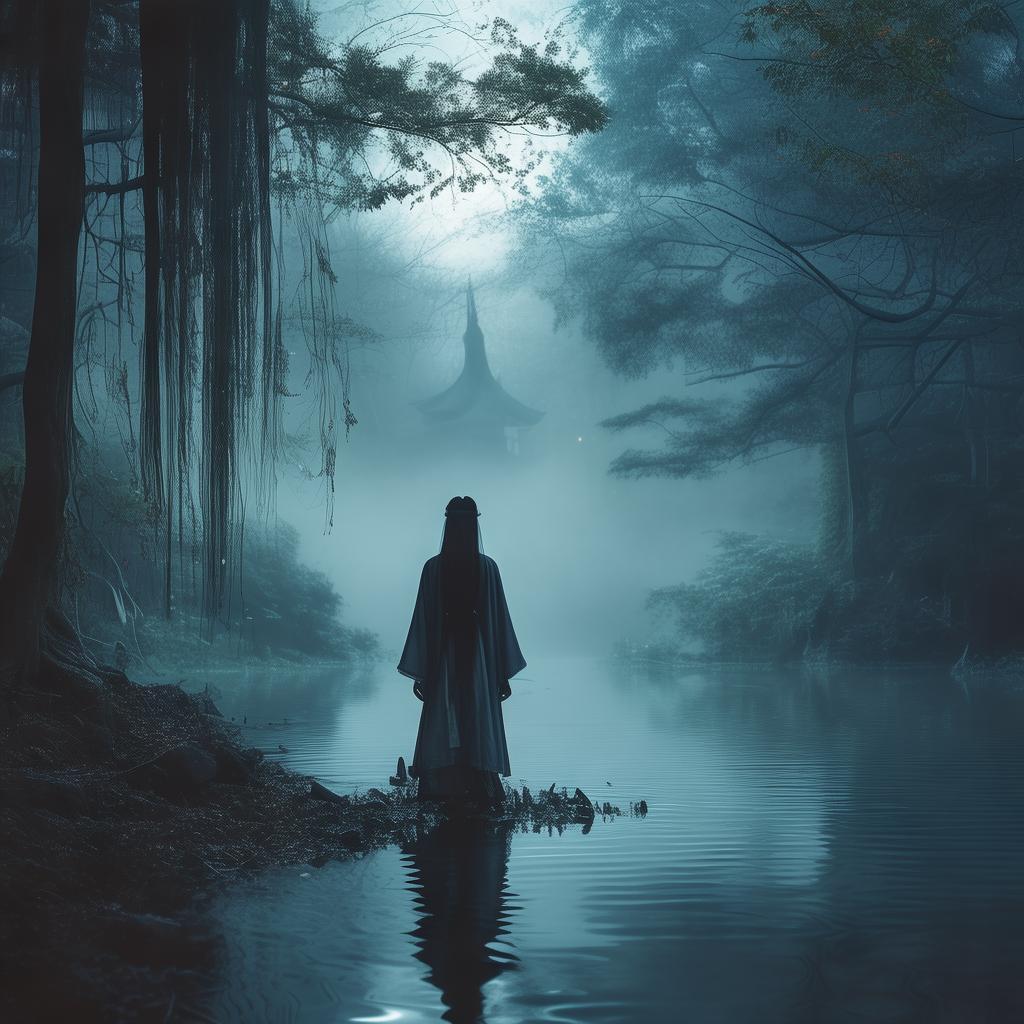Whispers from the Shadowed Labyrinth
In the quaint town of Jiaxing, nestled among the willow groves and the murmuring canals, there lived a young scholar named Ming. His name was whispered among the townsfolk for his wit and scholarly pursuits, but it was his insatiable curiosity that truly set him apart. One rainy evening, as he wandered through the ancient Chatuizhai library, he stumbled upon an old, tattered book that seemed to call out to him. Its title, "The Chatuizhai Ballad," intrigued him beyond measure.
The ballad was a tale of a labyrinth deep within the mountains, a labyrinth that was said to be the resting place of ancient spirits and lost souls. According to legend, those who dared to enter would either find themselves lost forever or discover the truth of their existence. Ming, driven by a thirst for knowledge and the thrill of the unknown, decided to embark on a quest to uncover the labyrinth's secrets.
With a map as his guide and a lantern as his only light, Ming set out at dawn. The path was treacherous, winding through dense forests and over rugged terrain. He encountered wild beasts and whispered winds that seemed to carry the voices of the dead. As the days turned into weeks, Ming's resolve waned, but his determination to unravel the ballad's mysteries remained unshaken.
One evening, as the moon hung low in the sky, Ming finally reached the entrance of the labyrinth. It was a narrow, dark passage, its walls adorned with eerie carvings of ancient runes and shadowy figures. With a deep breath, he stepped inside.
The labyrinth was a maze of interconnected tunnels, each one more foreboding than the last. Ming's lantern flickered and danced in the darkness, casting long, ominous shadows on the walls. He moved cautiously, his senses heightened by the eerie silence that surrounded him.
After what felt like hours, Ming stumbled upon a small, dimly lit chamber. In the center of the room stood a pedestal, upon which rested an ornate, ancient book. It was the book of the Chatuizhai Ballad, its pages filled with cryptic verses and haunting illustrations. Ming's heart raced as he approached the pedestal.
As he reached out to touch the book, a sudden gust of wind swept through the chamber, extinguishing his lantern. In the darkness, he felt a presence, a cold, unseen hand that seemed to grasp at his clothes. Paralyzed with fear, Ming could only watch as the shadows danced around him, forming shapes and faces that seemed to mock him.
"Who dares to enter my domain?" a voice echoed through the labyrinth. It was a deep, resonant voice, filled with malice and curiosity.
Ming, gathering all his courage, replied, "I am Ming, and I seek the truth behind the Chatuizhai Ballad. I wish to understand the mysteries that lie within this labyrinth."
The voice chuckled, a sound that chilled Ming to his bones. "Very well, Ming. But be warned, the truth is not kind to the faint-hearted. Only those with the strength to face the darkness can hope to survive."
With that, the shadows began to move once more, forming a path that Ming followed. It led him deeper into the labyrinth, through rooms filled with strange artifacts and forgotten memories. Each step he took seemed to unravel a piece of his own existence, revealing hidden truths about his ancestors and the labyrinth's origins.
Finally, Ming reached a vast chamber filled with ancient stone statues. In the center of the room stood a massive, ornate mirror. As he approached, the mirror's surface shimmered, revealing a reflection of the labyrinth's history. He saw the stories of those who had come before him, their triumphs and their defeats, their joy and their despair.
With a newfound understanding, Ming realized that the labyrinth was not just a physical place but a reflection of the human soul. It was a place where one could confront their deepest fears and desires, where the past and the future intertwined.
Ming stepped forward and looked into the mirror, seeing not just his own reflection but the essence of his own being. He felt the weight of his ancestors' stories and the weight of his own destiny. With a deep breath, he faced the mirror and whispered, "I am ready."

The mirror shone with a brilliant light, and Ming felt a surge of energy course through him. He opened his eyes to find himself standing in a clearing, the labyrinth behind him a distant memory. The sun was setting, casting a golden hue over the landscape.
Ming realized that his quest had not been just a physical journey but a spiritual one. He had faced the darkness within himself and emerged stronger. As he walked back towards the town, he carried with him the knowledge that the labyrinth was a part of him, and he was a part of the labyrinth.
The townsfolk welcomed him with open arms, marveling at his tale of courage and discovery. Ming shared his experiences with them, and soon, the Chatuizhai Ballad and its labyrinth became a legend that would be told for generations to come. Ming's quest had not only uncovered the secrets of the labyrinth but also the truth of his own identity, and with that, he found peace and fulfillment.
✨ Original Statement ✨
All articles published on this website (including but not limited to text, images, videos, and other content) are original or authorized for reposting and are protected by relevant laws. Without the explicit written permission of this website, no individual or organization may copy, modify, repost, or use the content for commercial purposes.
If you need to quote or cooperate, please contact this site for authorization. We reserve the right to pursue legal responsibility for any unauthorized use.
Hereby declared.









